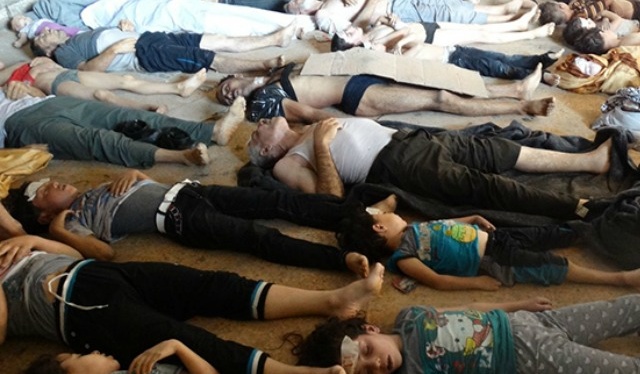UN votes on resolution early next week sanctioning Assad regime for chemical weapons
LATEST
- Reports: Explosions Kill Regime’s Senior Officers in Homs
- US Immigrations Bans “White Helmets” Cinematographer from Oscars
- Top US Commander in Northern Syria to Talk With Kurdish-Led SDF
Russia will veto a UN Security Council resolution calling for sanctions against the Assad regime over the use of chemical weapons on Syria’s civilians.
Despite the UN finding the regime responsible for use of chlorine weapons — and despite the Syrian air force dropping chlorine canisters in recent weeks — Russia’s Deputy UN Ambassador Vladimir Safronkov said on Friday:
There is an argument that the resolution itself contradicts the fundamental principle of presumption of innocence before the investigation is over.
We will veto it.
Safronkov asserted that there is “tremendous pressure” on the inquiry of the UN and the Organization for the Prohibition of Chemical Weapons joint inquiry to produce a one-sided result.
The draft resolution, which could be put to a vote early next week, seeks to sanction 11 Syrian military commanders and officials and 10 regime and related entities involved in the development and production of chemical weapons. Restrictions include an asset freeze and travel ban.
The Assad regime began testing chemical weapons in the conflict in late 2012. In August 2013, the use of sarin nerve agent near Damascus killed at least 1,400 people.
The US and Russia then led efforts for the regime to dismantle chemical plants and hand over all stocks. But despite giving up almost all of the banned chemicals, Damascus has continued to attack with chlorine, which is not listed under chemical weapons conventions.
In summer 2016, the UN and OPCW found the Syrian armed forces responsible for four incidents in 2014, filing a secret list of high-ranking individuals considered culpable.
Latest investigations by analysts of the conflict have concluded that the regime used chlorine in the offensive to recapture all of Aleppo city, and in current assaults on Damascus surburbs.
Significantly these are the first examples of chlorine used in surface to surface rockets, previous use was limited to airdropped bombs pic.twitter.com/In9EGYhO4x
— Eliot Higgins (@EliotHiggins) February 24, 2017
TOP PHOTO: Victims of the Assad regime’s sarin attacks near Damascus, August 21, 2013
Reports: Explosions Kill Regime’s Senior Officers in Homs
Pro-opposition sites say regime security headquarters has been hit by a series of explosions in Homs, with senior officers among the dead.
The Military Security Branch and the State Security Branch were struck by “suicide bombers”, killing at least 20 people.
Among the dead were the head of the Military Security Branch, Brigadier Hasan Daabol. The head of the State Security Branch, Ibrahim Darwish, has been wounded.
Local sources say the bombers were members of the Hay’at Tahrir al-Sham bloc, which includes Jabhat Fatah al-Sham.
The opposition sites said Daabol and Darwish have commanded the bombing of al-Wa’er, the last opposition-held neighborhood in Homs, and nearby rural areas.
Daabol also is said to have headed Branch 215, a military intelligence unit accused of mass detentions, torture, and killing of prisoners.
US Immigrations Bans “White Helmets” Cinematographer from Oscars
US immigration authorities have barred a 21-year-old Syrian cinematographer, who worked on the Oscar-nominated “The White Helmets”, from entering the country to attend the Academy Awards. that has been nominated for an Academy Award.
The Department of Homeland Security decided at the last minute to block Khaled Khateeb from traveling to Los Angeles because of “derogatory information”.
Derogatory information is a broad category that can include anything from terrorism connections to passport irregularities.
Pro-Assad activists and bloggers such as Max Blumenthal, Rick Sterling, Vanessa Beeley, and Eva Bartlett have carried out a sustained propaganda campaign against the White Helmets rescuers, who have saved more than 80,000 lives since their creation in 2013.
See Syria Feature: These Are The White Helmets
On Thursday, Sterling published an attack article on the White Helmets film in the Russian outlet The Duran.
Top US Commander in Northern Syria to Talk With Kurdish-Led SDF
The top US military commander for the Middle East, General Joseph Votel, travelled into northern Syria Friday to meet the Kurdish-led Syrian Democratic Forces.
The meeting came amid discussions of an offensive on the city of Raqqa, the Islamic State’s central position in Syria.
The US has backed the SDF, led by the Kurdish militia YPG, since its creation in autumn 2015. However, Turkey wants the YPG excluded from the Raqqa operation, as it believes the militia and the Syrian Kurdistan Democratic Party (PYD) are linked to the Turkish Kurdish insurgency PKK.
SDF spokesman Talal Sello said Votel “visited areas under our control…and met with several SDF commanders” as “confirmation of US support for our forces”.
“The results were positive. We discussed the developments in the Euphrates Rage campaign and shared military matters,” he asserted.
The commander of U.S. forces in Iraq and Syria, Lt. Gen Stephen Townsend, also visited the SDF base.
On Wednesday, Votel told journalists travelling with him in the Middle East that more US troops might be needed in Syria, although local forces would be the primary force.
“I am very concerned about maintaining momentum,” Votel said, in comments reported by the New York Times and other outlets.
“It could be that we take on a larger burden ourselves.”
Before travelling inside Syria, Votel held talks with Turkish officials about the forthcoming offensive on Raqqa, trying to deal with Ankara’s concerns.
However, Townsend said US military officials believe both Arabs and Kurds will be required to take the city “because the Kurdish component is the most effective”:
“We can’t just equip parts of this force, we have to equip the entire force.”

